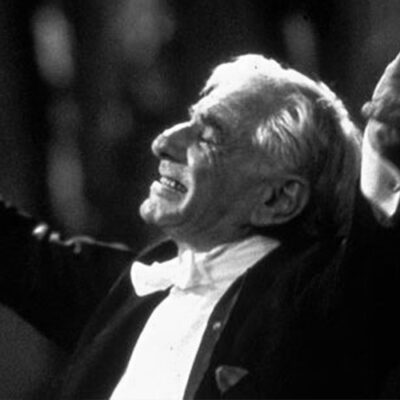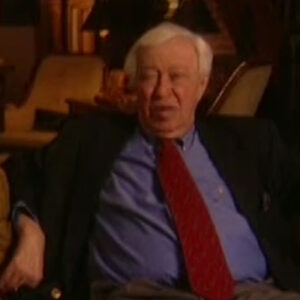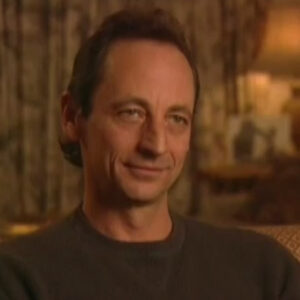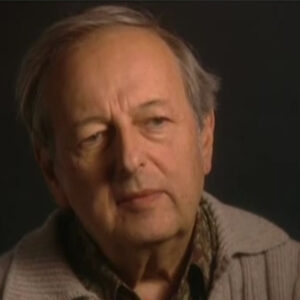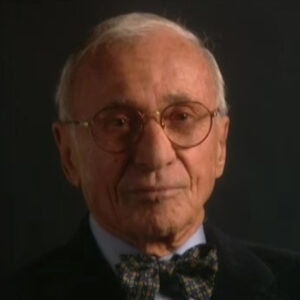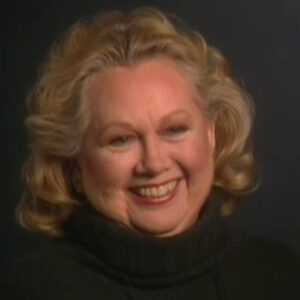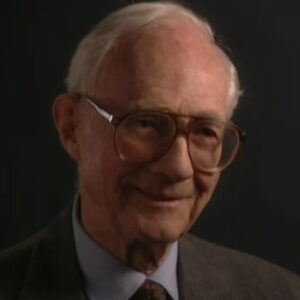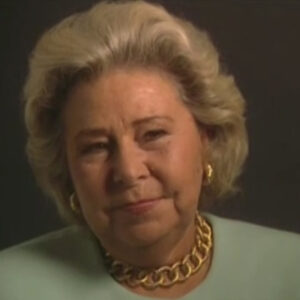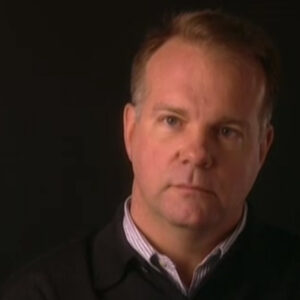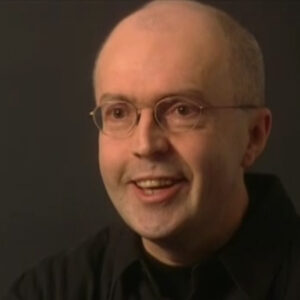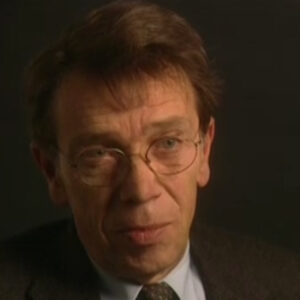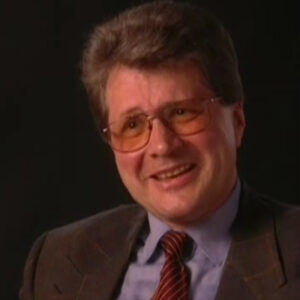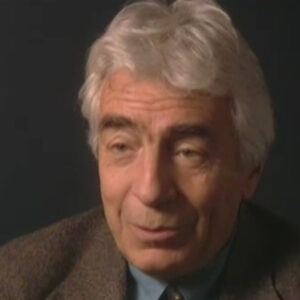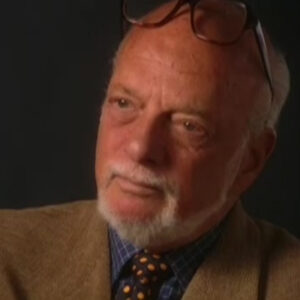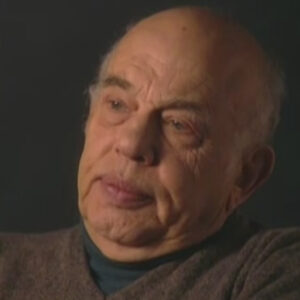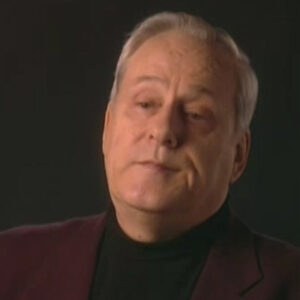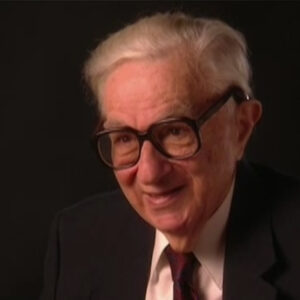Speaker My first meeting with Lenny took place of several years before I actually worked with him the first time I was singing Oedipus Rex by Stravinsky at the Hollywood Bowl with Michael Tilson Thomas. And it was, I think, 1980 anyway. It was a very wild sort of semi staged Oedipus in which we were all wearing costumes that were somewhere between Star Trek and Star Wars. And I remember my costume had a big flash Gordon lightning bolt down the front of it and. Big double row of buttons, and after the performance was over, I had no idea Lenny was there, he came into my dressing room, I heard a knock on the door, and I opened the door. And there was Leonard Bernstein standing there tanned and looking gorgeous, cigarette in one hand, glass of scotch in the other.
Speaker And he starts singing edifices first line and puts his arm around me. He said, that was really great kid like this. And that was my introduction to Lenny.
Speaker A couple of years later, when he and Steven Wadsworth were putting together trouble, not trouble in Tahiti, quiet place, I was asked to come up and sing for Lennie again. And I said, well, what should I sing? And he said, well, bring some things in English for Lenny. So I sang I think I sang something from the ranks progress. I sang O Rodgers and Hammerstein or something, and a song by John Alden Carpenter called Serenade. And it’s that particular song is a big sort of a tango. No, that Carpenter wrote in the 20s. Lenny had never heard it before. Now there’s something that you could perform, music that Lenny had not heard.
Speaker And he leapt up out of his seat and said, that’s a great fucking song. And he comes and runs over to the piano and starts to play it. That’s a great sign. He says, Damn, I wish I could sing.
Speaker And as it turned out, they asked me to do something in a quiet place, but I was not available and couldn’t become available. So, you know, I kicked myself for that. When we finally worked together on a project for the first time, it was in eighty six, I think it was, or 87. We did a recording of Puccini’s La Boheme and subsequent to that, then I did a couple of other big projects with him, Mozart’s Requiem and of course, Candied and. During that time, I got to know Lenny on lots of different levels.
Speaker Talk about the experience of level in La Bohème was.
Speaker Exhausting and fraught with all kinds of of ups and downs, and I know that subsequent to the project and during the project, Lenny took a lot of grief on lots of levels because No. One, he was in Rome with an all-American cast, you know, doing one of the two or three most well-known Italian operas and the Italian, I think. Well, I felt that the that we were sort of in the lion’s den there.
Speaker Hanging over the edge, because there we were in the middle of, you know, we were like, you know, that centage arcelia, which is which is just across the street from the Vatican. And there we are doing this quintessentially Italian opera with a bunch of Americans.
Speaker He also took a lot of grief for the fact that he hired to do memy Angelina Rayo, who had never really done an opera before. And behind the scenes, there were lots of, you know, machinations in some instances and a lot of yapping going on that, you know, you have to replace or you have to replace or you have to replace her. I was in kind of a strange position there because, you know, this was my alter ego.
Speaker And I must say I gained a lot of respect for Angie over the course of that because it took a cast iron guts to insert oneself into a situation like that, knowing that. Everybody’s focus was on her, you know, when are you going to screw up, kid? And I remember there was an instance in which there were several other Sopranos that. We’re sort of being kept on the sidelines, ready to jump in at a moment’s notice and. There was an incident that happened that to me was it was so illustrative of what Leonard Bernstein, beyond all the hype was about, they were trying to get him to replace Angie. And.
Speaker I mean, at that point, Angie was really doing a more than credible job with the whole thing, she she really rose to the occasion. But when they tried to talk Lenny into replacing her, I remember overhearing a conversation that I was not supposed to hear in which Lenny said, I can’t replace her. She has given me a year of her life and I can’t just cast her off like that no matter what you think.
Speaker Now.
Speaker There were lots of there are lots of people in the world that would have taken the easy way out. And would have found a way to issue all the the criticism and all the flak that was coming his way. He didn’t. And I think at the end of the day. Whether or not that recording goes down as a good boy, I’m a bad boy, I’m an indifferent boy, and it isn’t because of. Whether or not Angie Rail was the best or worst or most indifferent me of all, because at the end of the day, we were all there as an ensemble doing what I thought was our best work at the time. I think the recording is quirky because of Lenny’s approach to it. It had nothing to do with any individual performers. What do you mean? Well, what I mean is that one comes away from from La Bohème wanting a sense of youth and a sense of joie de vivre and a sense that there is nothing ahead of you but tomorrow’s which is why the tragedy of her death is so potent and so moving. When it all came out at the end of the day, what it appeared to me to be was the LMG. Of someone who was looking back on his creative youth, because there’s a tremendous I think there’s a tremendous.
Speaker Sense of reminiscence, a tremendous sense of yes, there’s a lot of joy in it, but there’s a lot of bittersweetness in it from the very beginning. And I remember during the rehearsal process for BOEM, Lenny was constantly. Oh, I don’t know, every once in a while, some anecdotal reference would be made to, you know, to when he was studying with such and such or so-and-so or the early days of Tanguy. You talked a lot about Koussevitzky during those those things. And I remember he had those Koussevitzky cufflinks were always there and.
Speaker It was just it was an interesting experience from lots of different levels. It was the first time I’d ever worked with Lenny. Musically and. You talk about somebody that pushed the envelope, that was Leny, I may be getting ahead of myself, but what I wrote, I was asked when he died, as were a lot of us, to write a paragraph or a few sentences about. You know, our thoughts on Lenny’s passing, and I frankly had no idea what to write, but what I came up with I think is germane. To that creative experience, I’d gone for several days and tried to write things down and I couldn’t. And finally I went to bed one night and just said, well, the hell with it. I’ll come up with something. And I woke up in the middle of the night and felt compelled to write these three sentences. And I don’t know where they came from. I said Leonard Bernstein introduced me to a world without fear for Lenny. There were no limitations. There were only possibilities. And when I stood on the podium or on the stage and looked into his eyes as he was conducting, I believed that neither were the gates of hell in assailable nor the gates of heaven unattainable. Now, that’s what it was like to work with him, because I had done, well, I don’t know, 60, 70 performances of BOEM at that point in my life and. Whenever you picked up a piece of music with Lenny. You could be confident that he had studied that piece backwards and forwards and his frame of reference was as broad as it gets. But he had this remarkable ability to be able somehow to trust that that was all going to be there if he jumped off the cliff with both feet and tried something that perhaps went against convention or that most people would say, I can’t do that. And I remember those rehearsals being a constant exercise in pushing me beyond what I could do. And I tell you, there were many, many moments in those rehearsals when we all felt that we were teetering on the edge of being not only over the top, but down in some abyss someplace, because we all of all of the landmarks that we were used to having as performers, the emotional landmarks, the stylistic landmarks, the the psychological landmarks, Lenny would would constantly try to shatter so that. You really felt as though you were that you were really maybe not boldly going where no man had gone before, but certainly going where no man had gone before and.
Speaker I remember particularly the attitude of the orchestra, the orchestra of Santa Julia. Who whom I had performed with on other occasions with other conductors and like a lot of great orchestras who are faced with somebody that has either a new take on something or someone who hasn’t proven himself in their eyes, orchestra players can be very difficult, as we all can, I suppose. But I remember rehearsals where with them, where a conductor would come to the podium and tap his baton like this and they would continue doing whatever they were doing for 20 minutes until the union steward stood up and went seniority, seniority, if I. Well, they had made their point that they were in charge with Lenny, it was different because they paid attention, but whatever skepticism they had about his approach to that piece.
Speaker Within about a day or two was gone, and they appreciated going on this journey too, and they appreciated being having their cages rattled and and being asked to question what they took. As a matter of course, they they seemed to enjoy being given permission to be naughty. And what I mean by that is being given permission to do it. In a way that was unconventional and to do it in a way which wasn’t. The prescribed way of doing things at the end of the day, of course, I think Lenny was incapable of doing anything that was grossly inappropriate because that he he simply lived, breathed, slept and ate music so that it was impossible for him. And it was always, I think, a matter of degree in a matter of balance and a matter of what the listener’s personal taste might be. But it was a really rollicking adventure. I’ll tell you that. And subsequent to doing that with him, I had to put Moambe away for a while and I’ve only done it I think twice since because. I think that that that. With that particular piece, I felt like we had pulled it apart to the point where I could never go back and do and do well again in a conventional way, because my whole idea about it had been shattered. However. That profoundly affected and changed the way I approached everything I have done since, I think that my performances in general have had more depth, I think I’ve been more willing to take personal risks. I think that I’ve been more willing to question why am I doing it this way? What is it that I’m trying to accomplish and am I just going through the motions because I think the thing that made Lenny craziest, at least in my experience, was people who illustrated to the audience the degree of homework that they had done as opposed to being spontaneous.
Speaker Human beings who were communicating something. I remember that there was a rehearsal for the Benedictus of the Mozart Requiem and the solo quartet, you know, dutifully went through it with Lenny and of course, with Lenny. You know, it was no matter how. Intimate that you were with him as a person, you know, no matter how much Lenny tried to put you at ease and tried to be one of the guys, he was still Leonard Bernstein. He was still the great guy I grew up with in central Illinois on television. He’s still the guy that invented music for me. And so there was always this part of you that was going, I’m here singing for Leonard Bernstein, I can’t screw up. Right? So we went through the Benedictus and and. We I mean, as we were saying, we all thought that we were, you know, pretty good at what we were doing and I will never forget this as long as I live. He threw down his baton, sort of frustrated. He took a big drag on his cigarette and he said, God damn it, I know you did your homework. And we all looked at him like that and he looked at us and he said, Don’t you realize that your brain’s. And your preparation and everything that you’ve learned about Mozart up to this point in your lives is not going to leave you for a second if you engage your heart’s.
Speaker And we all went, you know. Yeah, you’re right, Lenny gave everybody permission to fail.
Speaker Now, that sounds strange, doesn’t it, but that’s what it’s about, you have to not be afraid to fail. The other thing about human performances was that. Well, two things, a performance with Leonard Bernstein was not simply a musical experience.
Speaker Because oftentimes, if I’ll give you a prime example, in Vienna in nineteen eighty eight, I was there doing something with the Vienna State Opera and it so happened that Lenny was coming through to conduct the Vienna Philharmonic. They were going to do the Sibelius Second Symphony, which is in itself sort of a life journey symphony. I attended the Saturday rehearsal and then attended the Sunday morning performance that they did. And I will never forget those two moments, because it was you know, there was a small audience at the rehearsal and then, of course, they had the house packed at the performance. And it was it was like being at a rock concert. The degree of of of involvement on the part of the audience was palpable. And when they finished that last movement, the place just went nuts. And also the rehearsal was exciting. I rushed out to buy the live recording that had been made of that as soon as it was released. And it was disappointing. Not because it was done badly musically, but it wasn’t the totality of a Bernstine performance because he exuded. A life force on the podium that was undeniable and his almost childlike ability to experience that music that he knew, like the back of his hand and experience in it, experienced it as if he were hearing it for the first time, was so infectious to everybody. I remember looking at the at the double basses now the Vienna Philharmonic. Can be at sometimes a rather dour lot. Because of the culture they come from and, you know, because of the pressure that’s on them to always be the Vienna Philharmonic, I will never forget looking at those double basses who I had never seen smile in 15 years of singing with them. And they were playing like this. You know, and that’s because Lenny. The other thing about a Bergstein performance in my experience, was that it often went way over the top. Because everybody got carried along in that enthusiasm, everybody got carried along in. Wanting to wanting to break the bounds of where they had been before with any peace. But when it started to go awry, whether it was because of a choice Lenny made, but particularly when it was a choice that somebody else made. Lenny, never, ever let anybody hang out to dry. He never, ever said, no, that’s not the way I want to do it. Now, he may do that in rehearsal, but in performance, if somebody was seized by, I don’t know, a moment of inspiration or something or a moment of insanity, Lenny was right there. It said, you want to go that way, let’s go, let’s see what happens. And no matter what happened, if it started to go wrong, if everybody sensed that it started to go wrong, everybody would focus their attention on Lenny. And I remember instances when he knew it was, you know, when we were going into the garbage heap, when he would just give us a little smile like that.
Speaker Yeah, I know. Come on now. Get it back together and.
Speaker Then we would be back on on firm footing, but I’ve never. Ever met anybody, another conductor like that, with the possible exception of James Levine? Jimmy has a lot of the same qualities that that Lenny has in terms of. The risk taking abilities and of course, he was you know, Jimmy and Lenny were great, were great friends, so that’s not surprising. But it was extraordinary with Lenny because it was as if he was making love to you. In the best sense of that word, when he was performing, when he was conducting it, when you were working with him, it was a real soul partnership. And I think the people that had bad experiences with Lenny and I’m sure, you know, you’ll talk to them to. They had bad experiences because they weren’t willing. To go along for the ride and it was a hell of a ride.
Speaker This is fascinating. Yeah, it absolutely fascinating.
Speaker Now, he really got his sustenance to make the music. Mean all kinds of music. I never heard him badmouth any kind of music ever. For him, it was all part of the same fabric, whether it was a rap song or.
Speaker The Beatles or well, I’ll give you this is sort of an interesting sidelight, but right after the right after Lenny died. We were asked some of us to participate in the memorial service at Carnegie Hall.
Speaker The day that.
Speaker I guess it was the date, not the day before.
Speaker I mean, I’ve got to get my chronology straight.
Speaker They had called to ask me to do the Carnegie Hall thing that same day. I got a fax from Paul McCartney’s office asking me to come over and meet him because he was interested in my doing the Liverpool oratorio with him, which I eventually did.
Speaker And so there I was. And he wanted me to come on the same day as the memorial service. So do I fish or cut bait here? And I said, well, I have to do the memorial service. So I swallowed really hard and I composed this fact and I said, well, you’re never going to get to work with one of the Beatles now because you’re an idiot and you’re doing this. And I sent him the fax saying, I can’t come. On Thursday or whatever it was, because I have to do this memorial service for Leonard Bernstein.
Speaker And I hope you’ll understand, I got a fax back almost immediately within minutes, and it said, of course, you have to sing for Leonard Bernstein. He meant a lot to all of us sign Paul McCartney. You know, his his his influence on everybody was just astounding, and I can remember at. You know, four or five o’clock in the morning when Lenny was well into his cups. Lenny would sit down and start playing at the piano and he would play these improvised.
Speaker Piano fantasies in which he would start with Beethoven and go through Rodgers and Hart and the Beatles, and then he’d poke fun at Schoenberg and Barry and weave his way back, and he would make reference to just about everybody that you can imagine whose frame of reference was was was unbelievable.
Speaker Would he talk about what he’s doing? You know, he’d just do it and just do it. What did he say? When you discuss what some of these we talk about, you name it.
Speaker He did it. See, the thing is.
Speaker I I’ve read all the things that have been written about Lenny since he died, and I don’t pretend to have known him. On the same level that other people knew him, you know, intimately, personally, but Lenny was the kind of guy that was so open with everybody. My impression meeting him was that he desperately wanted to be. It was only my impression of it, I think you wanted to be one of the guys. But he couldn’t be. Because he wasn’t one of the guys he was. What we all aspired to be. And he he went to great pains to put people at their ease and he went to great pains to to use whatever was the current vernacular expressions. To. I don’t know, it was his way of saying to us, yeah, I know I’m Leonard Bernstein and I know who I am, but I put my trousers on one leg at a time like you do. So relax. Anyway, I’ve read all those things that that people have written about him, both good and bad, and in my experience, they’re probably all true. But you can’t judge Leonard Bernstein on the basis merely of. The the tabloid kind of exposes that are written about his human weaknesses, I think the only reason that we’re interested in his human weaknesses is because. The greatness that he achieved on so many fronts.
Speaker Seems to be so.
Speaker Unbelievable, how can one person do all that, that somehow we want to find the chink in his armor? To me, the thing that gives me hope as. As somebody who is profoundly flawed. Is that it’s possible to be flawed and to still achieve greatness because he did I mean, he was it I was I almost said is a genius because I don’t feel in some ways that he’s ever left those of us who worked with him. But he was he was a genius. His and I used the word life force before, but that life force was just.
Speaker It was pulsating and palpable, you know, you talk about the force, George Lucas doesn’t know about the force because he never I don’t think he ever worked with Leonard Bernstein. That was the force. And it was both the dark side and the light side all rolled up into one, but without.
Speaker Without all that stuff that that people like to point their fingers at and say, oh, well, see, he did this and he did that and he wasn’t so great after all. I don’t think I think it was the same capacity in him that allowed him to go to the Heights. Also allowed him to go to the depths, and I don’t think that he would have been Leonard Bernstein had he not had that capacity, to be quite honest with you, to answer your question, what did he talk about when he was in his cups? It was open season and he talked about everything I have. It was impossible to be bored around him. You could get angry because Lenny could be maddeningly childish and maddeningly petulant. And there were times when you thought, do you have to be the center of attention all the time? And of course, the answer to that question is yes, because you’re a hell of a lot more interesting than any one of us here. You know, you could take the combined experience of any room full of people and add it up. And it wouldn’t be any where near as interesting as one day out of the life of Leonard Bernstein. So sure be the center of attention. I don’t care.
Speaker How do you account for that obscene contradiction that he wanted to be one of the guys, which I truly believe. Yeah. And they also need to sort of thinking long term. I think it was profound self-awareness.
Speaker How could you not?
Speaker I’m going to answer your question, try to answer your question by using an analogous incident.
Speaker That that I have experienced.
Speaker I also know Joan Sutherland and Richard Bohning relatively well. Well, John Sutherland, as as opera singers goes, certainly a legend, one of the great legends of the 20th century, and when I first got to work with her. Was in the early 80s, it was right around the time I met Lenny and of course, you know, I thought, what’s a kid from Peoria doing on stage with Joan Sutherland? And I said something to that effect or even Goofy or to her. And I said, you know, I I feel so out of my element here, working with a legend. And she said something to me. That I think Lenny must have felt all the time in his own way, but he never articulated it like this to me. She said, well, she said, you know. I think that I am a very ordinary woman. To whom God has given an extraordinary ability.
Speaker And I think. In Lenny’s case.
Speaker He was an ordinary human being, I don’t mean ordinary in the sense that. I mean, obviously, he was he was he was a gifted person, but God gave him so many gifts. He never was able to define who he was himself, because when he was the old joke was when when you complimented Lenny on being a great conductor, he’d say, no, no, no, no, no, I’m a composer. And then you compliment him on that and you say, no, no, no, I’m a teacher. And you say, no, no, no. And he said, no, no, I’m not a teacher. I’m a I’m a writer. And everything he everything that he did, he did well and. You would have had to be deaf, dumb and blind, one would have to be deaf, dumb and blind, not to say, holy mackerel, look what I’ve done. When I walk into a room, look at what happens. Now, I don’t know what that feels like, but there must be. At the risk of trying to be an amateur psychologist, there must be a longing for a kind of a normalcy in a kind of an anonymity. That he never had he was totally recognizable wherever he went. You know, he couldn’t go down to a corner bar and say, you know, give me a Bud Light, because if Lenny did that, that was news. If you and I did it, who cares?
Speaker Lenny, to me, was the quintessential example of all the good things and all the bad things about celebrity. Because.
Speaker Well, anybody with that much to give.
Speaker And as you said to me, and it’s true, he gave and gave and gave and gave and gave. You need to get something back. And I think that on a one to one basis, most people with whom Lenny came into contact were so overwhelmed. By him, by his aura, by by his accomplishments, by his fame, that even when he opened himself up and gave you everything he had to give. You were not always sure how to respond.
Speaker And maybe, I don’t know, maybe maybe that left an empty place there for him, certainly there was nobody that I. I think there are very few people in the world that probably were his intellectual equals. You know, who who can he sit around and chew the fat with that’s going to really understand him? I remember conversations with him. Where he I know that he was not trying to be in any way superior or Off-putting to me, but. I could see in his face that as he was having an everyday, mundane conversation with me, that he that there were several other levels of thought that were going on.
Speaker And.
Speaker His insatiable curiosity and and his ability to extrapolate off of anything that was given to him and have a thought about it, some kind of a creative thought that must have been incredibly maddening to him, to not really have anybody. Who was his equal? I was joking with you about about jokes, I love to tell jokes and I love to tell stories and anecdotes and everything like that. Anybody that knows me well will attest to that. And Lenny was a great storyteller, and he loved to tell jokes and the more. And sometimes the dirtier the joke, the better. And I know a few of those myself. And we would go one on one. I didn’t mean for it to ever that to evolve into that, but he would say something and it would make me think of three other jokes. I said, would you hear the one about blah, blah, blah, bla, blah, blah, bla? And we would go like this and it got to the point where. It was the only it was the only part of my relationship with Leonard Bernstein, where I felt like I came close to approaching him as an equal. Now, many people would say that we were both dragged down to this level. But anyway, for that moment where we’re telling jokes, we were like this and. It got to the point that towards the war, towards the end of his life, when we were doing candied, I remember we were going back and forth at one point and he said no.
Speaker He said, I’m telling the last joke, so shut up.
Speaker And. I don’t know, I think that that need to be the center of attention or I articulate it that way. I don’t think that it was I never got the sense that it grew out of out of his selfishness or out of his. Any kind of an. I don’t know, an unsavory egotism, I think that he just gave and gave and gave to the point where it needed to be replenished somehow, and that was a way that he did it. And he was surrounded by people, his inner circle were people that made sure that that was that that was done. And, you know, I don’t I don’t pretend to know how that inner circle worked because I only observed it, but. It was clear to me that the people around him knew that he needed that and they made sure that he got it.
Speaker You talked about the inner circle. There’s an inner circle, which I would consider different from all those people who were around him again.
Speaker Yes, the inner circle, his family. Yeah, Betty. And is that what you’re talking about?
Speaker I mean, the people that were his professional inner circle, his his army of assistants and and things like that, because I think they tried to anticipate all of his needs, whether or not he articulated them or not and. That’s a hell of a daunting task. I mean, how do you anticipate the needs of somebody who’s larger than life?
Speaker I don’t think I could have done it. So you talking earlier about maybe I should just jump to this as on it.
Speaker Now, the is perceived the negative effect. So many.
Speaker Yes. People around the end of his life, any kind of separation from reality in his life. Can you tell me? Well, I’ve observed a few.
Speaker People that I would put in the same category of celebrity as Lenny, certainly as Paul McCartney. There is Lenny, I had a passing acquaintance with Gene Kelly. And. People that are in that situation, where everybody is there ready to take a piece out of them and ready to say I like this, tend to surround themselves. And I think they need to for purposes of sanity, they surround themselves with people that. Keep the world out in an effort that something normal can exist in a hermetically sealed bubble. It’s it’s a contradiction in terms. Well, in the case of Paul McCartney. He’s managed it brilliantly because he and Linda have managed to have a real life. And of course, with him there was the added thing that after John Lennon was assassinated, I don’t know this for a fact, but I assume that, you know, and then there’s the added concern of, well, what if some kook tries to take a shot at me? Well, somebody could have, I’m suppose, taking a shot at Lenny. And anyway, the McCartneys have raised three incredibly decent and normal. Children who are good people now that says a lot about the atmosphere that they created in that bubble. I think with Lenny, my perception of it and again. I’m not an expert on this because I’m only an observer, but.
Speaker I think that that Lenny’s life was in many ways. Tremendously hectic and overbooked, and I don’t think he my my feeling in the 10 years or 12 years that I was around him regularly, it didn’t appear to me that he ever had any quiet time. It never appeared to me that he really had any time that was his own, because there were so many demands being made on his time and there were so many people around him that were making sure that he got to where he had to be at a certain time, that that his whatever he needed to study was always there and everything. And I mean, I was not privy to to what actually went on behind those closed doors. But I know that there were there were always, you know, seemingly a dozen people or so that were. I think trying their best to help him, but people don’t live that way. You know, most of the rest of the world doesn’t live with like that, and I think, you know, perhaps that’s the price of that kind of celebrity and. We can all sit back and we can analyze it and we can say, well, if he hadn’t sought the celebrity then blah, blah, blah, I don’t think it’s that easy, though. It seemed to me that that with Lenny, it was a strange mix because. I never witnessed him. Giving.
Speaker In any way that was calculated or false? Personally, I never saw that, never. And when you have that capacity to be so open.
Speaker I think you’re going to invite.
Speaker Everything you retract everything into your life, and you need to have people that are pushing it away, trying to keep your arm’s length. So I think that there’s a strange sense of not unreality, but in reality that creeps in. It’s not a question of it being real or unreal. It’s it’s something else that exists somewhere in the middle and. You know, it’s all speculation, I think, what if Lenny had lived a normal life, would he have been Lenny? I don’t think so. I don’t think we’d love Lenny. I don’t think that he would be so fascinating to us if he had been normal. It’s the fact that he. Is.
Speaker A bad boy genius. That makes him appealing. It’s the same reason why we’re much more fascinated with John Wilkes Booth than we are with Edwin Booth. And, you know, if you look at the two lives, John Wilkes Booth, life was a failure, but he killed a president and that’s interesting to us because he’s a bad boy.
Speaker Edwin Booth had so many accomplishments on the American stage that, you know, it would take us all day to recount them. I mean, what other actors do you know that could perform Hamlet 100 consecutive nights? And he did that. Without a break 100 nights in a row did Hamlet, and we don’t care about that, but which of the two things serves the human soul more? What what John Wilkes did or what Edwin did? To Judge Leonie on the basis of of like I said before, his foibles to me is is insane because that’s not the point. What would you describe as his foibles? It’s everything that you and I do. But because it’s you and I doing it, it’s not interesting. So it’s not interesting if Lenny hadn’t written West Side Story and on the town and all the other things that he did.
Speaker We wouldn’t care about all the stories of who he slept with or who he got drunk with. Or what he supposedly shoved up his nose. Who cares? But he’s a celebrity and he’s Leonard Bernstein, and he’s the guy that came in and taught us all about music when we were kids, so we say. Look, we’re living in an age where we’re not supposed to have heroes anymore. We had heroes when I was a kid and when you were a kid, we had heroes, right. And now we’re not supposed to have heroes. Well, I don’t know, I mean, maybe maybe that’s.
Speaker On one level, that’s a good thing to recognize that everybody’s human, but on the other hand, if you don’t have heroes, you don’t have anything to which to aspire.
Speaker Was letting a hero to you? Of course he was. If you said to me earlier the silver lining for you invented music.
Speaker Well, he invented music for a whole generation of us. It started. Lenny invented music for a whole generation of Americans, were several generations of Americans. At the time that he started the young people’s concerts, we in this country, you know, were the ones that invented the term classical music, Americans invented that term, didn’t it doesn’t exist. It didn’t exist in any other culture before this because because of our the way we settled this country, there was a dichotomy that existed from the beginning between the soul, the the civilized eastern seaboard and those people going off into the frontier. And as people moved west, there was a very. Distinct separation between the people that were listening to cultivated music and the people that were listening to vernacular music, the music that they could take with them, you know, the whatever folk music. And there’s no other country in the world that has a Stephen Foster. We have that. So by the time the 20th century rolls around, we’ve been importing all of this European cultivated music. And at the same time, pop culture has been growing. And we invented this dichotomy, this chasm. Lenny believed that that was ridiculous. And he was the first serious musician who went on television with serious music and showed us that it was no different than the tunes that we were humming that we heard on the radio. Lenny was as conversant with Sinatra as he was with Sibelius, and he stood there every Sunday afternoon and infused us with the same kind of enthusiasm for the music and the same fearlessness that he had. Because if he did anything, he said, don’t be afraid of this. Don’t be afraid of this, I remember him saying you talked about what did he say in his cups? I can remember him one time saying, I don’t understand this attitude that has developed, that composers write music so that nobody can understand it. When we were doing Candied, I said to him, there’s a song in Candide called A Quiet, it’s about boredom, and he starts it with a 12 tone row ala Schoenberg. And then one of the characters yawns in response to that. And he plays another 12 tone role. And one of the characters goes, Oh, yeah, yeah, yeah. And I said, that’s brilliant. I said, What made you think of that?
Speaker And he said, I said, Any idiot can write a 12 tone.
Speaker Roy he said it takes a composer to write a tune. Well, that’s a very profound statement to make, right, and. When I say he invented music, what I mean is that I think he was undeniably the most intelligent musician I’ve ever met in my life. He was the most scholarly musician I’ve ever met in my life. But to him, all of that scholarship and all of that learning was not there to confine. But it was there to inform so that. So that the music could live and breathe as if it were being done for the first time every time and. He was the most inclusive musician I’ve ever met. The most inclusive musician I’ve ever met, because to him it was all part of the same fabric. He certainly knew the difference between a Mahler symphony and, you know, a Tin Pan Alley song that was written for some girl revue. But the thing that he I think that he taught me.
Speaker Without actually ever saying it was that those two guys that were writing those two very diverse things. We’re writing it from the same place it was all coming from the same place, it was only the vocabulary that was different.
Speaker And.
Speaker You know, for all we know, there’s somebody out there that can respond to that Tin Pan Alley song on the same levels that somebody who needs to feel like they are possessed of some arcane knowledge can appreciate the Mahler symphony. To Lenny, it was all part of the same fabric and.
Speaker I think that that those of us that grew up watching Lenny on TV. Were inculcated with an attitude about music. That. Is different, perhaps, than the way that. People who grew up in other cultures, in other countries. I have, because I know that I’m 45 years old and most of my colleagues of mine within, say, five years, either way of my age, all have the same kinds of broad and musical interests that I do. And I think that partially that’s because we’re Americans and we grew up in a multi faceted society, but it’s largely due to the fact that Lenny was out there all the time. All the time. Think about it. He wrote West Side Story and he was single handedly responsible for resurrecting Gustav Mahler. I mean, those two things don’t necessarily go together, but there he did it, didn’t he? And. I don’t I don’t think that the way we make music as Americans. Would be quite so interesting and quite so rich had Lenny not come along when he did.
Speaker To say, yes, yes, yes, I know that there’s all this American popular music here and there’s all this classical music here, but don’t you guys understand that they all go together? He told me a great story about George Gershwin once, he said that there’s that and I’ve seen this then printed in. I can’t remember in a book that I read a couple of years ago that Gershwin, when he was sitting in his Tin Pan Alley cubicle, was practicing Bach Partitas and some of his colleagues and in the in the tune factory came over and said, hey, George, what are you doing? You’re practicing to be a great concert pianist. He said, nope, I’m practicing to be the world’s greatest writer of popular songs. And that’s exactly what Lenny felt about it. Yeah, what did I want to talk about? Actually, I don’t want to guess I would never go back to Canada.
Speaker This is a very interesting poster, the interview about money being there. So, yeah. Can you do that? Yeah.
Speaker Yeah, it escapes me right now. Who who coined the term The American Century to refer to the 20th century. That’s right. Thank you very much, Henry Luce and. In some ways, I think Lenny is one of the few people who embody in one lifetime what that American century is about because. If you look at our history, it starts with the Spanish American war. With America literally exploding on the world scene with tremendous optimism and a tremendous sense of there’s nothing that I can’t conquer. And, you know, we go through the crucible of the Depression and World War Two and everything, we finally arrive in the 50s. At this state of feeling like we have arrived, we’re the good guys in the white hats. There’s nothing we can’t surmount. And the 60s roll around and we start questioning and then throughout the 70s, 80s and even into the 90s, we’ve kind of gone through a wilderness. We’ll look at Lenny’s life. You know, he explodes onto the scene, replacing. And indisposed colleague who is much more famous than he is after all that preparation, after all that, you know, youthful optimism, he bursts onto the scene.
Speaker He’s he’s riding on the town. In the 40s, when Lenny arrives in the 50s, he writes the central canon of. What we remember Leonard Bernstein for, right, he writes Candid and West Side Story within one year of each other.
Speaker And.
Speaker In some ways, then spends the rest of his life. Um. Trying to match that success. And no matter what he does. The general public and the critical community. Remembers him as the man who wrote West Side Story, where they remember him for more than that, and I know I’m oversimplifying, but. I think that there was a kind of a wilderness through which he roamed in the last couple of decades of his life, I mean, the people that knew him and the people that, you know, had followed him never lost sight of the fact that, you know, the only wilderness that he went through was a wilderness of perception from other people. But. What do you mean? I don’t think he ever lost his genius. You know, I’ve read all kinds of nonsense about how the fact that, well, he wrote Candy, that’s the peak of his creative life and then blah, blah, blah. Well, that’s nonsense. I mean, look at all the things he wrote after that. I mean, Chichester Psalms is one of the great pieces of music that any American has has composed in this century. Mass. Is an amazing. It’s just an amazing theatrical musical spectacle, religious spectacle, spiritual spectacle. Trouble in Tahiti and quiet place, you take those two pieces written so many years apart. And in their own way, they’re both, you know, masterpieces. I think part of it is the fact that the American public and the American critical community well, the American public, I think, is two things. The American public tends to pigeonhole people. Based upon that thing that is most easily recognizable about them. Right. With Lenny, it was a West Side story, right? Got it, Leonard Bernstein, West Side Story. Most the general public don’t realize what a contribution he made in all these other areas of American life after this film. Well, I think the critical community.
Speaker Well, historically, the critical community is largely comprised of of people who are either frustrated performers or frustrated composers or just frustrated. Most of them are anti social.
Speaker People who.
Speaker Who confuse criticism and characterization from discernment, and most critics are very. Week in discernment. And I think that that.
Speaker I think Lenny took a lot of heat that he didn’t deserve. From a critical community who was jealous of his success and from an academic. Musical world that was jealous of his success because Lenny could do it all.
Speaker And.
Speaker What a target. Yeah, what a target, what a target, but the point is that Leonard Bernstein will be remembered and nobody really cares about what the critics said because nobody liked Lenny except the public, you know.
Speaker That’s true, he said in an interview, actually, you did talk that one night that you were with him in the car business about by the time about circumcision.
Speaker Yes. And and his fear here that he would only be remembered as the guy with a straight story.
Speaker Yeah, well, I don’t remember exactly the context in which I said this in that interview that you’re referring to. But there were lots of moments when. You know, when those of us that worked with him at one point or another, we’d all become blubbering fans and, you know, say things like, I can’t believe I’m working with Leonard Bernstein, you know, who am I to work with? Somebody like you, that sort of thing. And Lenny, I think Lenny had a sense of his place in history. And he did say, well, you know, by the time Mozart was was, you know. 28, he’d done blah, blah, blah, blah, blah, blah, blah, blah, blah, and I’m, you know, going to be 70 and I haven’t done that. I remember one incident, and I don’t know whether this is the one to which you’re referring, but we had just finished recording the Mozart Requiem in a little town in Germany called Dison was southwest of of Munich. Beautiful little baroque church out in this village. And we had recorded for TV and also for for the Mozart Requiem. After the final performance, which we had recorded, we went to the home of coral reefs widow. She lived in a little on a little lake just around the corner from decent. And, you know, we had one of the the after concert parties for which Lenny was famous and somehow.
Speaker There were hundreds of people there and somehow.
Speaker I ended up writing back in the same car with Lenny to our hotel, which was 20 kilometers away. I got in the car with him. He was about four in the morning. Beautiful starlit night and we got in the car and Lenny flops himself in the back seat and looks out the window like this, silent and off we go, five, 10 minutes past. He reaches over and grabs my hand. My hand is on the seat next to me. And he grabbed my hand. As if. Were he to let go of that, he would that every molecule in his body would just dissipate. He was like hanging on for dear life.
Speaker Well, you know, I’d heard all the the sordid. Things that people like to tell about Lenny, and I’m thinking, oh, Christ, what am I going to do here now? I have to fight Leonard Bernstein over the back seat of my car. Within about two seconds, though, I realized that that wasn’t what that was about and that that was my, you know, responding to all that nonsense that I still, frankly, don’t believe that the way in which most of those stories are framed is actually true, because I don’t think that Lenny ever went anyplace with anybody unless that person opened the door and let him in. That I believe firmly. He held my hand as if he were going to float off the edge of the world were he to let go. And I didn’t know what to do. And at one point he turned. And sort of said rhetorically, he said, I wish there were someone in the world that understood what I’m trying to do. And then he turned and looked away. And never said one more word to me. We went all the way back to the hotel car, stopped in front of the hotel, he turned 60 in the morning. Kid got up, went up to his hotel room.
Speaker What do you do in a situation? I mean, I didn’t know I had nothing to say to that. I felt like what my that that my purpose in life at that moment was to just be there and to be another human being. On whose hand he could clutch like that. And I didn’t feel that there was any kind of a hidden agenda there. It was it was a it was the most.
Speaker It was like a small child, it’s like one of my kids saying, here, daddy, hold me.
Speaker However, just saying for a man who spent a lifetime trying to commute, trying to communicate, I sometimes have the feeling that the biggest frustration in his life is that we’re surrounded by a bunch of people who he knew somehow didn’t really get it.
Speaker Well, yeah, I don’t think that it was necessarily the when we say that he was surrounded by people who didn’t get it, I don’t think that. I think that his inner circle got it, and I think that those of us that were in the you know, the concentric circles that surrounded that got it, too. But there was a large percentage of the public.
Speaker That only.
Speaker Particularly the young public that responded to Lenny because he was a celebrity. They responded to the bang and not to the substance, and I I don’t know, because I’ve never been in a situation like that, you know, that was that intense and that. And that overwhelming, but I would assume that it must be really, really frustrating.
Speaker For somebody.
Speaker Did on a daily basis what he did to have people only respond to the trappings of it. You know, it’s like it’s like writing the great American novel and having somebody tell you how much they enjoyed the cover art.
Speaker That had to be really frustrating to him. And. To be someone.
Speaker Who?
Speaker I think strove for excellence all the time in a world where. People mistook. His search for excellence, for elitism, because he was not elite, he was the most. Democratic musician I’ve ever met with a small D because he was so all inclusive and everything must have driven him nuts to have people responding to him because he was famous and not because of what he had done.
Speaker But I guess that’s the price of fame in our world and also to be so generally misunderstood. I mean, I think he was really misunderstood by critics and they just don’t get what you are. So.
Speaker Well, see, I’m cynical enough to believe that they did understand and that they. Let their own agendas. Color, what they said, because there’s nothing that makes people more prone to want to topple you from your throne than. Succeeding without them, you know, and I you know, I do believe that that the arbiters of taste and the arbiters of what we’re supposed to think held Lennie in contempt because he didn’t need them. He had transcended them.
Speaker And he really knows in his heart, in his heart, I don’t know, because I never asked him that question and I was not close enough to him to ask that question, but.
Speaker I think he had transcended it. I can tell you that since he died. Something has gone out of our profession.
Speaker He and Herbert von Corian were the two great pillars of the classical music industry. They both exerted a similar kind of force in the world, and those twin pillars fell within a year of each other and. It was almost as if well, certainly in the case of Lenny, it was almost like Lenny was a beacon out there, and even if we chose to ignore him or forget about him, he was still there. He was still giving us a frame of reference and. It’s interesting to me that now we’re having books written like The Death of classical music and people are bemoaning the. The state of our cultural life in America, I’m not I’m not suggesting that Leonard Bernstein was solely responsible for the health of our cultural life, but I think that he is certainly. I think his death marked the end of an era. And I don’t think I know it’ll be a long time before we see a giant like that again, because his experience was just so, so much a part of of the. You know of a golden age in American cultural life. His his circle of acquaintances read like a who’s who of of American life. He was on a first name basis with everybody and. I just I don’t see anybody out on the horizon, even the people who are Bernstine pretenders, lovely young conductors out there who, you know, had coffee with Bernstine who want to be touted as the next Bernstine, there is no next Bernstine. You know, a totally different front. It’s like somebody saying I’m the next John Wayne. There is nobody. A singular, he’s a singular, he is he is he is a singular entity, and there will never be another one quite like him.
Speaker Let’s talk about Candy. Yeah, I get that. You know, he talked to you about coming at that. Candy is frustration with Candy.
Speaker You say he referred to it as he referred to it as the stone candy.
Speaker Candide was the last thing I did with Lenny, and it was we did that project about eight months before he died and he had always referred to it, according to Jamie. As the stone in his shoe, because it never quite got. The acclaimed. That in retrospect, it seems that it should have. And. That that whole experience of of singing the title role in that with Lenny was. Was oh, gosh, I could I could talk about that all day, that experience, the thing that I have come away from, candid thinking, is that it’s ironic. And somehow fitting that that piece. It’s so hard for people to.
Speaker To accept.
Speaker Because to me, it is the perfect musical portrait of Leonard Bernstein, because that piece is everything that Lenny was, and maybe that’s the reason why it’s so difficult for people to come to terms with Leonard Bernstein because Candide is irreverent. It’s caustic, it’s. Incredibly satirical and at the same time, its profound and its eclectic, and it has a broad frame of reference, its highly literate, its. Incredibly. In some ways, pedestrian, some of the some of the some of the almost vaudevillian jokes that are used, it’s everything. It’s everything all together. It’s everything that Lenny was, and it’s hard for people to watch candy, to listen to Candy and come away with a simplistic. Assessment of what it is they’ve just seen and heard. And depending upon your mood, when you hear or see Candy, you come away with something totally different.
Speaker Well, that’s what happened with Lenny. It depended upon what sometimes what you had for breakfast or how late you’d stayed up with him the night before, you know, singing until 5:00 in the morning around the piano.
Speaker You know what what you felt about him the next day?
Speaker Can you give me actually, because I don’t think I have anybody else, just a sort of thumbnail description of Candy.
Speaker What what what he was doing was based on what the what candidate is based upon candidates based upon a very, very satirical novella by Voltaire in which the. Writings of a German philosopher who believed that. Because everything happens for a purpose in life that we live in the best of all possible worlds, and that even when terrible tragedies happen, when millions die because of pestilence, that it’s part of a divine plan that we don’t understand. Well, that could not have been farther away from Leonard Bernstein’s view of the world. And certainly look at the people who helped him adapt the book. Lillian Hellman being.
Speaker One of the many.
Speaker I think that in a way.
Speaker It’s about railing against I mean, Lennie’s setting up, it rails against the absurdities and the injustices and the prejudices of which the world is full and. You know, Lenny died just at the point when political correctness became it became vogue, and I think it would sicken him to see. Something that’s supposedly based in giving equal, giving an equal no excuse me, not to everyone’s. Uniqueness being turned into. A tool by which we push each other away from each other and our uniqueness becomes not a way to bring us together, but a way to push us apart and and make us fearful of each other. Candied is not about any of that stuff. Candied is about. Looking at life and saying, isn’t this absurd, what we do to each other, isn’t this absurd, the kind of judgmental nonsense that goes on here that causes such suffering in the world? I mean, the finale of that make our garden grow. Is it still?
Speaker Moves me and makes me cry when I hear it and when I sing it, because after going through all this stuff, the characters all say, well, I was pretty stupid, wasn’t I? Why don’t we just admit that we’re all in this together and make our garden grow together?
Speaker I don’t know in some ways maybe that the text of that song is one of the most fitting legacies for Lenny, because if you ever worked with Lenny, if one ever worked with Lenny or one was ever touched by Lenny. Your garden bloomed with a few more flowers that it didn’t have.
Speaker When you started and.
Speaker What was interesting to me about that candid experience was that we didn’t do it staged, we did it in a kind of a lecture concert format. And except when Lenny gave a lecture, it was never a lecture. You never felt like you were being put upon because it was so entertaining and. Somehow, one could see because Lenny would speak between the numbers and give us insights into why he wrote this or or why he wrote that, what jumps out a couple of things he said about the playfulness of it because, uh. Oh, I can’t not I I can’t remember the exact instance, but there is a tango. That the character of the old lady sings called, I am easily assimilated, and there is one rhyme in there. Which is. Totally. Whimsical and totally based upon. A bit of silliness that occurred between Leny and Felecia in which. They couldn’t find a rhyme for a particular word that Lenny had chosen to my father was born in Robel Gabbana. I think that’s what it is, which a government, which is a I guess a town, a little village in Russia where one of Lenny’s ancestors was born. He couldn’t find a rhyme for it. And his wife, Felicia, came up with it to rhyme it with the word Aranea. And so she sings that born in Rovell governor. And then the chorus sings something in Spanish, which means, help me. I think I’m getting a hernia.
Speaker Well, I mean, it’s just nonsense, right?
Speaker But it’s nonsense on such a I don’t know, such a highly literate and playful level. The score is full of that sort of thing and. I think that’s another thing that I love about Candy, that is in the midst of all of the the seriousness and all of the comment that’s being made about the the the absurdity of the way people treat each other in the world, there’s a tremendous amount of fun. I don’t think Lenny ever didn’t have fun. Even when he was conducting the most tragic. Piece of music, the most profoundly moving piece of music that you can think of, it was fun. It was always fun. Even when you were exhausted at the end of it, you always went away thinking, oh, let’s do that again tomorrow or now you talked about humanity.
Speaker Yeah, which is can you talk specifically about about how? Because you’ve talked so well, that is how you see that reflected in various works.
Speaker Well, I don’t think you can possibly. Right, the music that he wrote and not be possessed of a profound humanity.
Speaker Oh, gosh, so many different things just take West Side Story as an example, I mean, Lenny would probably hate it that I’m using West Side Story yet again as an example. But but.
Speaker The very simplicity.
Speaker Of most of the songs in West Side Story are indicative of profound humanity. There’s a place for us somewhere, a time and place for us. How many people in the world haven’t thought that at one time or another or the exuberance with which Tony sings, I just met a girl named Maria. And when I say her name softly, it’s like praying. And when I say it loud, there’s music playing well and it’s one step above Moon June spoon croon and yet it goes right to the heart. You can’t. Right, great music. If you’re not humble enough. To understand the value of simplicity, and I think if you look at the music of Lennie’s or the music of anybody. Which doesn’t ultimately capture the public’s attention. It’s not because it’s too simple, it’s because it’s too complicated. Because I personally have never met a stupid audience, I don’t know, Lenny shared that attitude, perhaps they’re not conversant with the subject matter that you’re presenting, but if you present it in a way which. Speaks down to the audience, audiences can turn you off, and Lenny’s approach with all music was to go right for the jugular and say, here, here’s something we can all understand.
Speaker And simplicity, which I share is great, art is part of why. Do you know what I don’t think Lenny ever set out to create art.
Speaker Because art is a subsequent judgment that’s based upon how the listener. How the receiver responds to it, you know what I think Lenny was Lenny was the greatest entertainer who ever lived. He was the greatest entertainer who ever lived, and I mean that. In the broadest possible sense of that word, because a real entertainer. Looks you right in the eye and engages you. And says, listen to what I have to say. See if you don’t feel the same thing that I feel, and boy, he did that better than anybody.
Speaker Better than anybody. And.
Speaker I frankly think that Mahler and Beethoven and certainly Mozart and all those great composers whose music Leni brought to life would have been happy to entertain their listeners.
Speaker Because isn’t that what it’s about? And if it’s art.
Speaker That’s that’s for the that’s for the listener to to say that’s not to suggest that Lenny ever made music randomly because it was beyond him to be random about anything. And. You know, any great artist, anybody who we who we call a great artist is somebody that possesses an understanding of the subject matter and is a supreme technician. But the great artists are not the ones who are the prisoners of technique or the prisoners of their knowledge, but they are the people who use that as a springboard to be. Spontaneous and to be. To be really creative, and that’s what Lenny was. But I will always think of Lenny as as a great, great, great entertainer who was able, while he entertained us, to teach us, to chastise us, to mold us and to make us think and that’s pretty good.
Speaker I think it’s great. Can we just turn the camera off on your latest check of.
Speaker Let’s talk about that’s exactly what you mean when you say that you stood in front of him. He was showing you the world without fear. That’s very, very simple as a performer.
Speaker One often feels. Put upon in a strange way, because there is. Whether it’s real or perceived, performers in general feel like the sword of Damocles is hanging over their heads and that there is an impending judgment and retribution in store for those who don’t do it right. Lenny was the most fearless person I have ever met in my life, and he simply wouldn’t brook any of that. Fear on the part of his artists, he he would turn somersaults to put someone at ease so that that person, instead of trying to protect themselves. From the judgments that they thought were going to be assessed by him or the critics or the public or, you know, in the case of classical music, we often go on stage feeling as though we are being that that our that our goal ought to be to live up to some. Definitive standard of performance that someone has set for us in the past and Lenny just didn’t believe that any of that mattered. Because what was most important was what did we all. How did we all respond to what that composer and that person who had written the words that we were singing? Indicate to us that he felt when he put it on the page or that they felt when they put it on the page, and certainly he required us to do our homework and he required us to have thought about what we. Did and to have an opinion about what we did, but at the end of the day, when you stood on stage with him, all he cared about was whether you were going to go on the journey with him and. That’s a very freeing experience. Very freeing experience because it’s not possible for anybody to be wrong in a in a in a situation like that, it’s possible for you perhaps to make choices that aren’t as meaningful to your listener at that moment as other choices might be. But there’s no wrong. There’s no wrong. It’s I suppose it’s very Zen. There’s no trying. There’s just doing.
Speaker Let me try to question you. Were you would like to not at the funeral.
Speaker I was only at the memorial service in Carnegie Hall, you know, that at his funeral cortege went by his construction site, the construction workers stopped to pick up their hands. Yes. Yes.
Speaker And you think about that. Does that say to you that ladies like what that says to me about Lenny’s life?
Speaker Is that, in fact. More people understood what he was trying to do than he thought. That’s what I think, unfortunately, the construction workers of the world. May this be the only time that Spiro Agnew and I ever agree on anything but the vast or silent majority of people out there. I think respected Lenny to the point where they wouldn’t come up and try to take a piece of him, and I think he didn’t realize how much he meant to people, how much he meant to the average person out there, because the people that were taken with his celebrity were part of I wouldn’t call it the lunatic fringe, but the the. They were part of that group of people that were fanatically devoted either to his music or to his celebrity or whatever, and unfortunately, those were the only people that he saw. And he never saw the guys.
Speaker Up on the roof of the building who?
Speaker You know, maybe they wouldn’t sit down, listen to a Mahler symphony, but they knew who he was. I think that’s a great story, I mean, that I think he would have I think he did love that from wherever he was looking down.
Speaker You know, I think he may finally have said somebody did understand, perhaps I like to think of him, you know. Sitting in in his heavenly mansion with a glass of divine scotch in one hand and.
Speaker You know, an equally divine cigarette, in the other hand, looking down and smiling at those guys. One of the things that I still think about was the day that I heard Lenny had died, I was surprised how I reacted to it. Because it it was a mixture of two things. It was a mixture of the same thing that I felt when I heard John Kennedy had been assassinated and it felt like I had lost a family member. I remember my wife and I. Hearing the news on CNN now, my wife met him twice or three times, I think he didn’t really spend any time with him and she started to cry. And I started to cry. And I was really I don’t know what I expected because. Anybody that knew him would have, you know, would have responded, but I was really surprised at how profoundly upset I was and I know that I’ll go to my grave remembering where I was and what I was doing when Leonard Bernstein died.
Speaker That’s interesting.
Speaker Yeah, I do have one last question there, actually think, yes, it was me that told this story. It was we were having a reception in Rome at some incredible ducal palace and the whole cast of BOEM was there, I think it might have been after the first performance or the second performance, the concert performance.
Speaker And, you know, there there were the the.
Speaker The normal.
Speaker There was the normal array of beautiful people there to meet Lenny and whatever and. It was well into the party, we’d been there a couple of hours and. Lenny was engaged in some conversation with an insufferable Italian aristocratic woman who was just babbling on. With drivel about this and that and the I think you tell Lenny was getting really.
Speaker Bored with the whole thing, and he was starting to fidget, and he had his opera cape over his shoulders and his cigarette in his hand, in his drink, in his hand, and she was going on and on and on, started to talk about West Side Story. And you could see Lenny’s eyes rolled back in his head. He takes a big drag off of his cigarette, blows smoke right in her face and says, You know what?
Speaker He said, it’s really depressing because I’ve done this and I’ve done that and I and I’m only going to be remembered as the man who wrote West Side Story, one of my colleagues is standing next to me who is highly medicated at that point.
Speaker And he looks at me and he says, well, that’s not so bad when you think about it, because it’s better than being remembered as the man who wrote a quiet place.
Speaker And it was I don’t know, it was very, very funny.
Speaker And I told Lenny that story the next day. And he loved it. He loved it. It was a great story. It was a great story.
Speaker How do you think he felt about his own composition? You tell this story that Sondheim, which I forgot to wonder.
Speaker Well, I don’t know whether Lenny would actually voice this, but I did it. A gala honoring Stephen Sondheim a few years ago at Carnegie Hall and somehow Lenny’s name came up, as it always did, and. I don’t know, somehow people were talking about, well, which is a better piece, this or that, and Stephen Sondheim said, listen to the only person that ever loved every note that Lenny wrote was Lenny. And I think that’s probably true. He believed wholeheartedly in everything he did.

